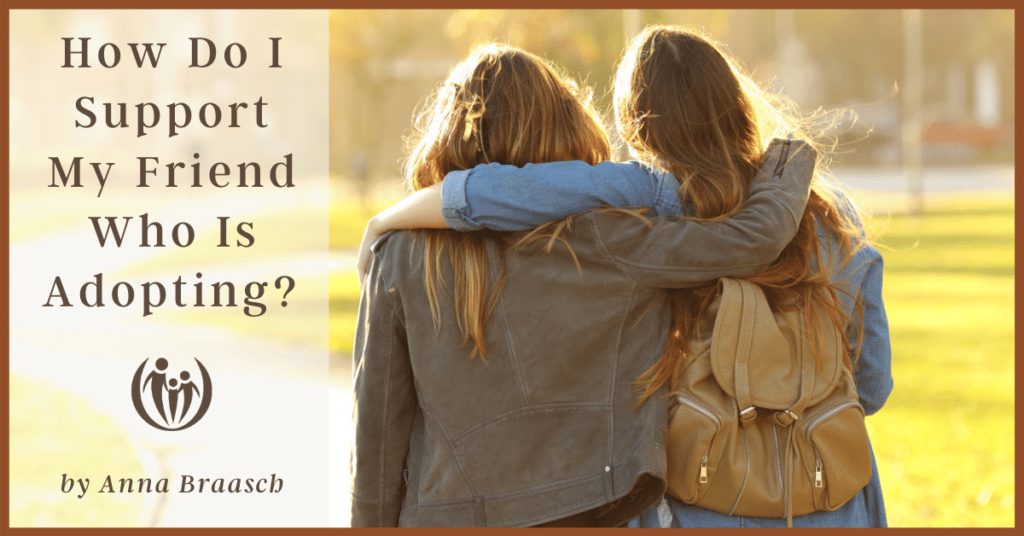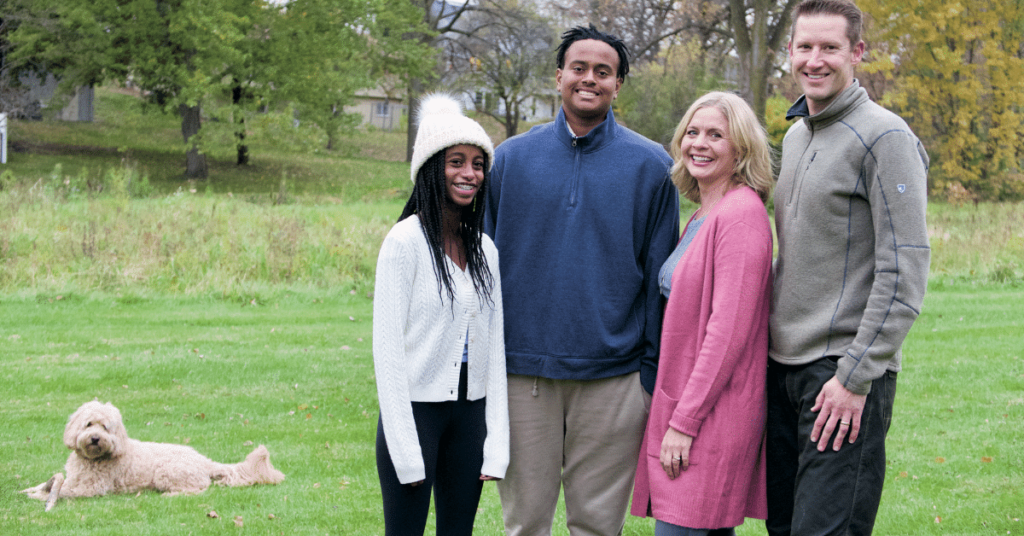
How Do I Support My Friend Who Is Adopting?

November is National Adoption Awareness Month here in the United States. In honor of that we’ve asked Anna Braasch, Executive Director of Connected Families, to share her insight on how to support friends who are currently adopting or have already adopted.
Your friend just told you that she is adopting. You are so excited for her! You want to be supportive, but you just aren’t sure if you are going to ask the wrong questions, or say something insensitive. So how do you support your friend who is adopting?
Adoption is a unique calling and you may even wonder if you have anything to offer your friend. As an adoptive mama myself, I acknowledge that there is a special connection between myself and other adoptive parents; a “knowing” or understanding that uniquely bonds us. But I have also leaned on the support of an extended group of friends, especially when that support is thoughtful and well-informed.
By using the Connected Families Framework with your friends who are anywhere in the adoption process, you will show your willingness to try. That goes a long way!
If you are struggling with the best way to support a friend through adoption, read on!
FOUNDATION: My friend, you are safe with me…even when our families form differently
During the adoption process, or after the new addition has joined the family, when you drop off food (PLEASE drop off food!), this is a great time to clearly communicate, “You are SAFE with me.” How? In writing. Maybe even with pen and paper.
Try something like this:
“I am so excited for you and your parenting journey! I realize that because I haven’t adopted, I don’t have the same experiences and insight as you. But I want to walk this road with you! I hope, over time, to learn to be there for you in the most helpful ways. I’ll do my best to not ask insensitive questions or say inappropriate things. If I do, would you call me out? I don’t know what I don’t know. :-)”
If it has been years since your friend has adopted, it’s never too late to communicate this type of message. Your friend’s family will always have unique needs and challenges due to their adoption experiences. Knowing that you’re a safe friend, even in light of all that, makes your friendship a real treasure.
Whether your friend is thinking about adopting, has recently adopted, or it’s been years since she has adopted, only do this if you plan on following through with the friendship. If you don’t, it’ll just be awkward. 😉
CONNECT: My friend, you are loved….even if you isolate yourself
I know this isn’t true for all adoptive parents but, for me, I felt constantly judged in my early years of parenting. It is clear we are an adoptive family (picture below), so I always felt very visible. And watched. And judged. And alone. It became natural to isolate. So what did I do? I isolated. It was much easier to not go to the playgroups than go and feel like I was under the microscope.
When isolation could be healthy for adoptive families
Now, mind you, this was different from the “cocooning isolation,” which most adoptive families will proactively choose. Cocooning is an initial time of focused care between the adoptive family and the new adoptee(s). During that phase, it’s both normal and healthy if your friend says they’re not accepting visitors or allowing others to hold their new baby. Note: this time is even more critical when your friend adopts an older child. Cocooning can last several weeks to a few months and is both healthy and necessary.
But I kept isolating when isolation wasn’t healthy because I dreaded feeling analyzed.
There is a good chance the moms at the playgroup who hadn’t adopted were feeling the same thing! But I didn’t stick around to find out.
What can YOU do if your friend isolates?
- Your friend isolates past the cocooning phase: Pursue the friendship. Let her know you are there and want to hang out in a judgment-free zone.
- Your friend says she still isn’t ready: You say, “Ok! I’ll check back in with you in a few months.” (And then keep your promise.)
- Your friend lashes out with a “You don’t understand!”: You respond with a “No, I don’t. If you are willing, I’d love to understand more. If not, that’s OK too.”
Being unphased and steadfast in the relationship will allow your friend to know that she is loved…no matter what.

COACH: My friend, you are called and capable….of parenting your kids
My theology rests heavily on the truth that God brings beauty from ashes and that ALL things can be redeemed through Jesus Christ. Adoption is (mostly) possible because of traumatic events. The turmoil, stress, and grief that a birth (or, what we use “first”) mother likely feels when placing her child for adoption must be profound.
God didn’t allow loss and trauma in the world just so people could become parents! BUT… God can and does redeem loss and trauma.
NOT HELPFUL: I feel deflated when someone says, “God wouldn’t give you more than you can handle. God knew that your kids needed a family.” Then it is all on MY shoulders! I’ve got to get this right!
INSPIRING: The best thing someone can say to me is, “I love how God brought your family together. What a miracle on display that you found each other! I am excited to see how God continues to work in you and through you as He knits your family together.”
THAT fills me full of courage! It lets me know that I am CALLED and CAPABLE! And God is not going to leave me nor forsake me.
CORRECT: My friend, you are responsible…for “next-level” parenting
I was tempted to leave out this section but as I was wrestling through it, I knew we needed to touch on how my parenting does not look like traditional parenting.
When my kids were 3 & 5, my friend Amy pointed out some parenting blind spots and encouraged me to check out Connected Families. The fact that she also had kids through adoption made me sit up and take notice of what she was saying.
That said, even if you haven’t experienced adoption yourself, don’t assume you can’t talk about parenting with your friend. If you’ve journeyed this road with her, through the ups and downs, you may have earned the right to speak truth into your friend’s life.
However, proceed with caution and lots of empathy! Starting with honesty about your own struggles and the limitations of your understanding of what it’s like to be an adoptive parent is a good plan. So often, in friendship, the way we gently correct each other is through sharing our own stories and how we’re owning our responsibility.
How demonstrating responsibility in friendship might look:
“Some days I feel so exasperated with Bobby! My gut feeling is that the issue has a lot to do with my desire to control him, but the message I am sending him is that he’s the problem. There’s an organization called Connected Families that has been helping me work through some of my own issues as I parent him. I know things are different for you as an adoptive mom, but if you’re interested, I’d be happy to send you their information. For me, I am so desperate to parent in a way that shows more grace.”
Or maybe:
“I am struggling! I used to use time-outs all the time, but I recently read a blog post from Connected Families about time-ins. It has really challenged me to think through the message I send my kids when I send them away from me during their misbehavior. I don’t even fully know how to apply it yet. Do you have any experience with time-ins?”
Or maybe a non-judgemental conversation starter, like this:
“One of the blogs I read has a ‘safety covenant’ that a mom wrote to her adoptive son. Have you heard of this idea? I’m considering creating one with my kids, even though they’re not adopted, because I think I need the reminder! Do you have any thoughts on them?”
And if the conversation goes south, or your friend feels like you’re pointing out her parenting challenges, go back to SAFE and LOVED and don’t give up on your friendship!
A big caveat: Your friend may have a different story than mine
Your friend may have a very different story and different experiences from mine. So take the practical advice I give lightly. Generally speaking, a good place to start with your friend is to ask the question, “How can I be a support and an encouragement to you right now? If you don’t know now, no problem. I’ll check back in with you in a few days/weeks . ” (It goes without saying….please follow through.)
The importance of prayer
One of my long-time friends (who hasn’t experienced adoption) drops everything to pray for me anytime I call. She doesn’t say she’ll pray for me. She actually does. This is always such an encouragement to me in my parenting.
Her prayers are always simple. They are never long. It’s never awkward. And she also doesn’t ask. She always just jumps in mid-conversation, like this: “Holy Spirit, Give Anna exactly what she needs right now to be the mom and wife you’ve called her to be. Fill her with courage and wisdom and insight to channel Your love to her family. We love you Jesus. Amen. “
God has given us the gift of community. May God bless your efforts as you seek to be a steadfast friend to an adoptive parent in your life.
Learn more about the Framework
Want to dig deeper into Connected Families’ Parenting Framework?
Get our FREE ebook, What Kids Need: 4 Messages That Build Identity.




